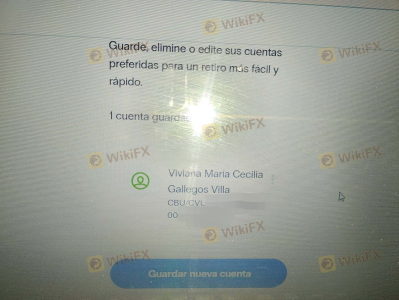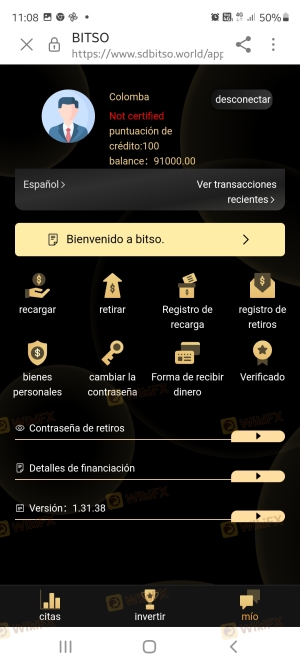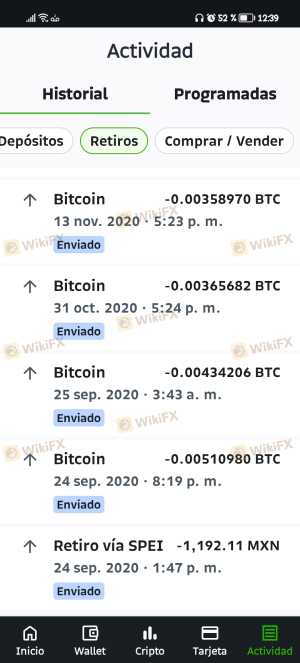Is Bitso safe?

Pros
Cons
Is Bitso Safe or Scam?
Introduction
Bitso is a cryptocurrency exchange that has established itself as a key player in the Latin American market since its inception in 2014. With a focus on providing access to digital assets for users in Mexico and beyond, Bitso has become a popular platform for trading various cryptocurrencies, including Bitcoin and Ethereum. However, the rise of cryptocurrency trading has also brought forth a plethora of unregulated and potentially fraudulent platforms, making it essential for traders to conduct thorough evaluations before engaging with any exchange. This article aims to provide a comprehensive analysis of Bitso's legitimacy, regulatory status, and overall safety for potential investors. To achieve this, we will examine various aspects of the platform, including regulatory compliance, company background, trading conditions, customer experiences, and risk factors.
Regulation and Legitimacy
Understanding the regulatory environment in which a trading platform operates is crucial for assessing its legitimacy. Bitso claims to be regulated by the Gibraltar Financial Services Commission (GFSC), which is known for its innovative approach to financial regulation. However, the effectiveness and robustness of this regulation can be questioned, especially when compared to more stringent regulatory bodies such as the FCA in the UK or ASIC in Australia.
Here is a summary of Bitso's regulatory information:
| Regulatory Authority | License Number | Regulatory Region | Verification Status |
|---|---|---|---|
| Gibraltar Financial Services Commission (GFSC) | N/A | Gibraltar | Active |
While Bitso holds a license from the GFSC, it is important to note that this regulatory framework is often considered weaker than those provided by tier-one regulators. Additionally, several reviews indicate that users have reported withdrawal issues and other complaints, raising questions about the efficacy of the regulatory oversight. The absence of a robust regulatory framework can expose traders to risks, as they may have limited recourse in the event of disputes or fund mismanagement.
Company Background Investigation
Bitso was founded in 2014 by a group of entrepreneurs aiming to enhance financial inclusion in Latin America through cryptocurrency. The company is owned by Badger Technology Company Limited, which operates in multiple jurisdictions, including Mexico, Argentina, and Brazil. Despite its growth, Bitso's transparency regarding its ownership structure and management team leaves much to be desired.
The management team consists of individuals with backgrounds in technology and finance, but detailed information about their professional experience is scarce. This lack of transparency can be concerning for potential investors, as it makes it difficult to assess the company's overall credibility and reliability. Moreover, the absence of a clear communication channel or customer support options can further exacerbate concerns about the company's commitment to its users.
Trading Conditions Analysis
Understanding the trading conditions offered by Bitso is essential for evaluating its overall value proposition. Bitso employs a maker-taker fee model, which is common among cryptocurrency exchanges. However, the fees associated with trading on Bitso can be higher than the industry average, which may deter some traders.
Here is a comparison of core trading costs:
| Fee Type | Bitso | Industry Average |
|---|---|---|
| Major Currency Pair Spread | Variable (0.50% - 0.65%) | 0.10% - 0.30% |
| Commission Model | Maker: 0.50%; Taker: 0.65% | Maker: 0.10%; Taker: 0.20% |
| Overnight Interest Range | N/A | Varies by broker |
While Bitso offers a straightforward fee structure, the higher costs compared to industry averages could significantly impact traders who engage in high-frequency trading. Additionally, the absence of a demo account and educational resources may hinder novice traders from familiarizing themselves with the platform before committing funds.
Customer Funds Safety
The safety of customer funds is paramount when evaluating a trading platform. Bitso claims to implement several security measures, including two-factor authentication (2FA) and secure storage of customer funds. However, the effectiveness of these measures has been called into question by users who have reported issues with withdrawals and account access.
Bitso does not provide specific information about fund segregation or investor protection measures, which are critical components of a secure trading environment. The lack of transparency regarding these safety protocols raises concerns about the potential risks involved in trading on the platform. Furthermore, any historical incidents of fund mismanagement or security breaches could significantly impact the platform's reputation and user trust.
Customer Experience and Complaints
Customer feedback is an invaluable resource for assessing the reliability of any trading platform. Bitso has received mixed reviews from users, with several positive experiences highlighting its user-friendly interface and competitive trading options. However, a significant portion of feedback has been negative, particularly concerning withdrawal issues and unresponsive customer support.
Here are some common complaint types and their severity assessment:
| Complaint Type | Severity Level | Company Response |
|---|---|---|
| Withdrawal Issues | High | Slow or unresponsive |
| Customer Support | Medium | Limited communication |
| Account Access Problems | High | Unclear resolution process |
Two typical cases illustrate the challenges faced by Bitso users. In one instance, a user reported being unable to withdraw funds for several weeks, leading to frustration and a loss of confidence in the platform. In another case, a trader experienced difficulties accessing their account after a system update, with customer support taking an extended time to respond. Such experiences can significantly undermine user trust and raise red flags for potential investors.
Platform and Execution Quality
The quality of the trading platform and execution is crucial for any trader's success. Bitso offers a proprietary trading platform that is generally regarded as user-friendly. However, some users have reported issues with order execution, including slippage and order rejections. These issues can be particularly detrimental during volatile market conditions, where timely execution is essential.
Furthermore, there have been indications of potential platform manipulation, as some users have noted discrepancies between market prices and execution prices. Such practices can severely impact traders' profitability and raise ethical concerns about the platform's operations.
Risk Assessment
Engaging with Bitso carries several risks that potential traders should consider. The combination of regulatory shortcomings, high fees, and customer complaints presents a concerning picture for prospective investors. Here is a summary of key risk areas:
| Risk Category | Risk Level (Low/Medium/High) | Brief Explanation |
|---|---|---|
| Regulatory Compliance | High | Weak regulatory oversight |
| Customer Support | Medium | Slow response times and limited options |
| Platform Reliability | High | Issues with execution and withdrawals |
To mitigate these risks, potential traders should conduct thorough research and consider using alternative platforms with stronger regulatory frameworks and better user reviews.
Conclusion and Recommendations
In conclusion, while Bitso presents itself as a legitimate cryptocurrency exchange, several factors warrant caution. The combination of regulatory concerns, high trading fees, and numerous customer complaints raises significant red flags. As such, traders should approach Bitso with caution and consider exploring alternative options.
For those seeking reliable trading platforms, it may be prudent to consider exchanges with robust regulatory oversight and positive user feedback, such as Coinbase, Binance, or Kraken. These platforms offer more transparent fee structures, better customer support, and a proven track record in the industry. Ultimately, the decision to engage with Bitso should be made with careful consideration of the associated risks and potential alternatives.
Is Bitso a scam, or is it legit?
The latest exposure and evaluation content of Bitso brokers.




Bitso Similar Brokers Safe
Whether it is a legitimate broker to see if the market is regulated; start investing in Forex App whether it is safe or a scam, check whether there is a license.
Bitso latest industry rating score is 1.45, the higher the score the safer it is out of 10, the more regulatory licenses the more legitimate it is. 1.45 If the score is too low, there is a risk of being scammed, please pay attention to the choice to avoid.